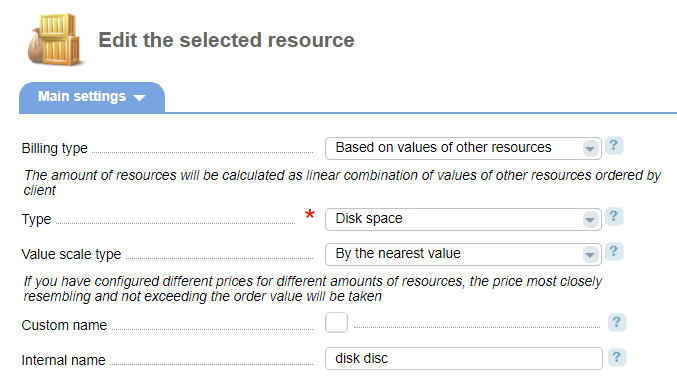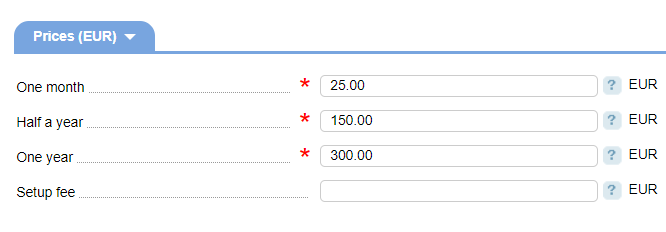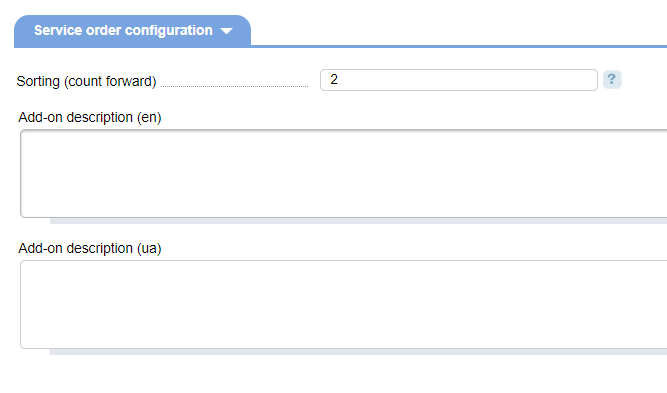This billing type allows specifying how a certain resource will depend on another one. At least two addons are required the dependent and influencing.
A dependent addon — the amount of this addon is changed automatically. A client cannot edit the amount. The billing type is Based on order.
An influencing addon — a client can change its amount.
Example: when a client orders a "Shared hosting" service, he/she can change the addon "Databases". The hosting provider sets up the dependency between the number of databases and disk space on the server. Every database should be allocated 1 GiB of disk space. Therefore, the database is the influencing addon, and disk space is the dependent one.
You can configure dependence among multiple add-ons. You can create several dependent add-ons and one influencing, or several influencing and one dependent.
Configuration
Main settings

Billing type — select how you want to charge your clients for add-ons.
Type — addon that clients can order. For example, mail domains, RAM, traffic.
Value scale type — this is how the billing system will calculate the addon price. More information can be found under Value scale.
Custom name — selecting this checkbox will display the Name field. Here you can enter the name that will be used as the addon name.
Internal name — here you can set a custom name for the resource system name. We strongly recommend that you change this name only when you know what you are doing!
Calculations
The main parameter is a dependency ratio. It defines how many items of a dependent addon are required for one unit of an influencing addon.
Example: when a client orders a "Shared-hosting" service, he/she can change the amount of the addon "Database". The hosting provider sets up the dependency between the number of databases and disk space on the server. Every database should be allocated 10 GiB of disk space.
We need to set the dependency ratio for the influencing addon (database).

Rounding procedure is a method that allows converting a non-integer into an integer. Based on values of other resources add-ons can be defined only by integers. When calculating a required amount, the result may be a non-integer (when a fractional coefficient is used). The billing system will round the resulting value automatically. There are three rounding methods:
-
- Mathematically. The result is 125,37. It will be rounded to 125.
- Rounding forward. The result is 957,12. It will be rounded to 958.
- Rounding downward. The result is 526,97. It will be rounded to 526.
Only addons — the system will count only additional resources which are not included in the tariff plan.
Example: when a client orders a "Shared-hosting" service, he/she can change the amount of the addon "Database". The hosting provider sets up the dependency between the number of databases and disk space on the server. Every database should be allocated 10 GiB of disk space. The tariff price includes 5 GiB of disk space and 5 databases.
If the Only addons checkbox is not selected, the billing system will count the total number of databases including those from the tariff plan (5 databases). Additional disk space will be added after the client orders 6 or more databases. Since the tariff plan includes 5 databases, they will require 5 GiB of disk space. This amount is included in the tariff price, so additional resources are not required. When the client orders the 6th database, 1 GiB of disk space will be added automatically.
If the Only addons checkbox is selected, the billing system will count only the amount that was ordered in addition to the tariff plan. Disk space will be added when the client orders 11 or more databases. Since the tariff plan includes 5 databases, they do not require disk space. The next 5-10 databases will have enough disk space (5 GiB is included into the tariff plan price), so additional disk space won't be ordered. When the client orders the 11th database, the system will add 1 GiB of disk space automatically.
Traffic limits

Unit of measure — units of measure for this addon.
Tariff plan includes — the amount of resource that the tariff plan includes by default (in the units of measure selected above).
Minimum value - the minimum amount available for order. It cannot be less than the value included in the tariff. Leaving the field blank will apply the minimum amount from the Tariff plan includes field.
Prices
in this tab, you can set addon prices. Entering a value into the Month field will automatically calculate prices for the other periods. You can change the prices if needed. The prices are specified in the tariff currency.

Service order configuration

Sorting (count forward) — addon sorting order on the order page. If there are several resources with the same sort order, they will be sorted alphabetically.
Upload icon — select an image for this addon.
Addon description — addon description for every active localization in the billing system. The system displays this information in a hint (the'?' symbol) on the order page. You can use the following HTML-tags in this field:
-
- <br/> — line break.
- <b> </b> — bold print
- <i> </i> — italics.
 En
En
 Es
Es